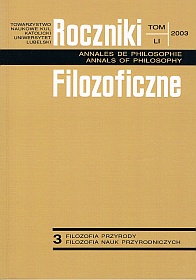Nature as a Natural Limit of Naturalism
Abstract
At first glance naturalism seems to be an integral part of contemporary science. For science there exist only those phenomena which can be examined with scientific methods (an ontological thesis), and any explanation of those phenomena must appeal only to natural causes, i.e. to structures, processes and regularities underlying those phenomena, and not to any supernatural forces (a methodological thesis). If we look at naturalism as a paradigm of doing science, a pattern that determines what and how should be investigated, some limits of this paradigm show itself.
When doing experiments, scientists sometimes meet moral prohibitions of treating certain obviously natural objects in certain ways. This fact may be interpreted as a product of social evolution which science is entitled to ignore, for it can change in the process of further evolution, or as an external factor which science should not ignore under the peril of losing social support. None of these interpretation does justice to some basic facts about science (including the fact that social support was never withdrawn regardless of well known cases of immoral scientific practices). The prohibition of treating certain natural objects in certain ways may also be interpreted as a consequence of discovering the moral dimension of nature understood as the essence of things. Yet, the normative dimension of nature cannot be investigated with scientific methods. Thus, for a consistent naturalist it does not exist; and even more − following moral prohibitions could be seen as detrimental for science in cases where morality prohibits applying the most effective scientific methods. It seems however that no scientist defends the reduction of scientific ethics to scientific methodology. In this sense the nature-essence of things practically limits naturalism seen as a paradigm of doing science.
The paper argues for the above thesis in three steps: (1) various meanings of the terms “nature”, “natural”, and “naturalism” are presented; (2) it is shown in what sense contemporary science is unnatural but naturalistic; (3) a case where science “meets” moral prohibitions concerning natural beings − producing transgenic animals − is discussed. It is then shown that any interpretation of these prohibitions consistent with the naturalistic paradigm cannot be maintained, whereas the interpretation which recognizes the moral dimension of nature-essence does justice to facts and intuitions concerning this case.
References
Gould S. J.: An Urchin in the Storm. London: Penguin Books 1990.
Jodkowski K.: Metodologiczne aspekty kontrowersji ewolucjonizm − kreacjonizm. Lublin: Wydawnictwo UMCS 1998.
Leksykon filozofii klasycznej. Red. J. Herbut. Lublin: TN KUL 1997.
Mauron A.: Ethics and the Ordinary Molecular Biologist. W: W. R. Shea, B. Sitter. Scientists and Their Responsibility. Canton, Mass.: Watson Pub. International 1989 s.249-265.
Tranøy K. E.: Ethical Problems of Scientific Research: An Action-Theoretical Approach. „The Monist” 79:1996 No. 2 (Forbidden Knowledge. Eds. A. Lekka-Kowalik, D. Schulthess) s.183-196.
Verhoog H.: Moralność a „naturalność” zwierząt transgenicznych. „Ethos” 1998 nr 4 (44) (Etyka badań naukowych) s.215-227.
Wolpert L.: Nienaturalna natura nauki. Tł. H. Chojnacki, E. Penksyk. Gdańsk: Gdańskie Wydawnictwo Psychologiczne 1996.
Copyright (c) 2003 Roczniki Filozoficzne

This work is licensed under a Creative Commons Attribution-NonCommercial-NoDerivatives 4.0 International License.





